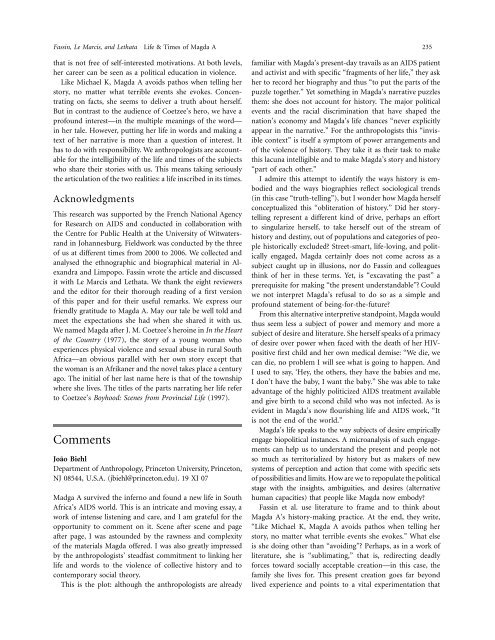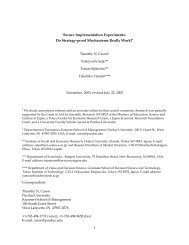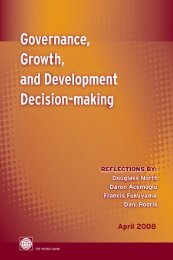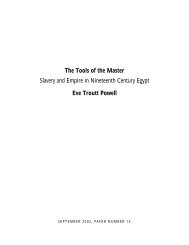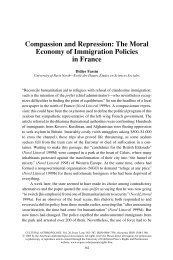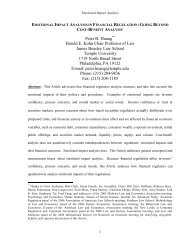Life & Times of Magda A: Telling a Story of Violence in South Africa
Life & Times of Magda A: Telling a Story of Violence in South Africa
Life & Times of Magda A: Telling a Story of Violence in South Africa
You also want an ePaper? Increase the reach of your titles
YUMPU automatically turns print PDFs into web optimized ePapers that Google loves.
Fass<strong>in</strong>, Le Marcis, and Lethata <strong>Life</strong> & <strong>Times</strong> <strong>of</strong> <strong>Magda</strong> A 235<br />
that is not free <strong>of</strong> self-<strong>in</strong>terested motivations. At both levels,<br />
her career can be seen as a political education <strong>in</strong> violence.<br />
Like Michael K, <strong>Magda</strong> A avoids pathos when tell<strong>in</strong>g her<br />
story, no matter what terrible events she evokes. Concentrat<strong>in</strong>g<br />
on facts, she seems to deliver a truth about herself.<br />
But <strong>in</strong> contrast to the audience <strong>of</strong> Coetzee’s hero, we have a<br />
pr<strong>of</strong>ound <strong>in</strong>terest—<strong>in</strong> the multiple mean<strong>in</strong>gs <strong>of</strong> the word—<br />
<strong>in</strong> her tale. However, putt<strong>in</strong>g her life <strong>in</strong> words and mak<strong>in</strong>g a<br />
text <strong>of</strong> her narrative is more than a question <strong>of</strong> <strong>in</strong>terest. It<br />
has to do with responsibility. We anthropologists are accountable<br />
for the <strong>in</strong>telligibility <strong>of</strong> the life and times <strong>of</strong> the subjects<br />
who share their stories with us. This means tak<strong>in</strong>g seriously<br />
the articulation <strong>of</strong> the two realities: a life <strong>in</strong>scribed <strong>in</strong> its times.<br />
Acknowledgments<br />
This research was supported by the French National Agency<br />
for Research on AIDS and conducted <strong>in</strong> collaboration with<br />
the Centre for Public Health at the University <strong>of</strong> Witwatersrand<br />
<strong>in</strong> Johannesburg. Fieldwork was conducted by the three<br />
<strong>of</strong> us at different times from 2000 to 2006. We collected and<br />
analysed the ethnographic and biographical material <strong>in</strong> Alexandra<br />
and Limpopo. Fass<strong>in</strong> wrote the article and discussed<br />
it with Le Marcis and Lethata. We thank the eight reviewers<br />
and the editor for their thorough read<strong>in</strong>g <strong>of</strong> a first version<br />
<strong>of</strong> this paper and for their useful remarks. We express our<br />
friendly gratitude to <strong>Magda</strong> A. May our tale be well told and<br />
meet the expectations she had when she shared it with us.<br />
We named <strong>Magda</strong> after J. M. Coetzee’s hero<strong>in</strong>e <strong>in</strong> In the Heart<br />
<strong>of</strong> the Country (1977), the story <strong>of</strong> a young woman who<br />
experiences physical violence and sexual abuse <strong>in</strong> rural <strong>South</strong><br />
<strong>Africa</strong>—an obvious parallel with her own story except that<br />
the woman is an Afrikaner and the novel takes place a century<br />
ago. The <strong>in</strong>itial <strong>of</strong> her last name here is that <strong>of</strong> the township<br />
where she lives. The titles <strong>of</strong> the parts narrat<strong>in</strong>g her life refer<br />
to Coetzee’s Boyhood: Scenes from Prov<strong>in</strong>cial <strong>Life</strong> (1997).<br />
Comments<br />
João Biehl<br />
Department <strong>of</strong> Anthropology, Pr<strong>in</strong>ceton University, Pr<strong>in</strong>ceton,<br />
NJ 08544, U.S.A. (jbiehl@pr<strong>in</strong>ceton.edu). 19 XI 07<br />
Madga A survived the <strong>in</strong>ferno and found a new life <strong>in</strong> <strong>South</strong><br />
<strong>Africa</strong>’s AIDS world. This is an <strong>in</strong>tricate and mov<strong>in</strong>g essay, a<br />
work <strong>of</strong> <strong>in</strong>tense listen<strong>in</strong>g and care, and I am grateful for the<br />
opportunity to comment on it. Scene after scene and page<br />
after page, I was astounded by the rawness and complexity<br />
<strong>of</strong> the materials <strong>Magda</strong> <strong>of</strong>fered. I was also greatly impressed<br />
by the anthropologists’ steadfast commitment to l<strong>in</strong>k<strong>in</strong>g her<br />
life and words to the violence <strong>of</strong> collective history and to<br />
contemporary social theory.<br />
This is the plot: although the anthropologists are already<br />
familiar with <strong>Magda</strong>’s present-day travails as an AIDS patient<br />
and activist and with specific “fragments <strong>of</strong> her life,” they ask<br />
her to record her biography and thus “to put the parts <strong>of</strong> the<br />
puzzle together.” Yet someth<strong>in</strong>g <strong>in</strong> <strong>Magda</strong>’s narrative puzzles<br />
them: she does not account for history. The major political<br />
events and the racial discrim<strong>in</strong>ation that have shaped the<br />
nation’s economy and <strong>Magda</strong>’s life chances “never explicitly<br />
appear <strong>in</strong> the narrative.” For the anthropologists this “<strong>in</strong>visible<br />
context” is itself a symptom <strong>of</strong> power arrangements and<br />
<strong>of</strong> the violence <strong>of</strong> history. They take it as their task to make<br />
this lacuna <strong>in</strong>telligible and to make <strong>Magda</strong>’s story and history<br />
“part <strong>of</strong> each other.”<br />
I admire this attempt to identify the ways history is embodied<br />
and the ways biographies reflect sociological trends<br />
(<strong>in</strong> this case “truth-tell<strong>in</strong>g”), but I wonder how <strong>Magda</strong> herself<br />
conceptualized this “obliteration <strong>of</strong> history.” Did her storytell<strong>in</strong>g<br />
represent a different k<strong>in</strong>d <strong>of</strong> drive, perhaps an effort<br />
to s<strong>in</strong>gularize herself, to take herself out <strong>of</strong> the stream <strong>of</strong><br />
history and dest<strong>in</strong>y, out <strong>of</strong> populations and categories <strong>of</strong> people<br />
historically excluded? Street-smart, life-lov<strong>in</strong>g, and politically<br />
engaged, <strong>Magda</strong> certa<strong>in</strong>ly does not come across as a<br />
subject caught up <strong>in</strong> illusions, nor do Fass<strong>in</strong> and colleagues<br />
th<strong>in</strong>k <strong>of</strong> her <strong>in</strong> these terms. Yet, is “excavat<strong>in</strong>g the past” a<br />
prerequisite for mak<strong>in</strong>g “the present understandable”? Could<br />
we not <strong>in</strong>terpret <strong>Magda</strong>’s refusal to do so as a simple and<br />
pr<strong>of</strong>ound statement <strong>of</strong> be<strong>in</strong>g-for-the-future?<br />
From this alternative <strong>in</strong>terpretive standpo<strong>in</strong>t, <strong>Magda</strong> would<br />
thus seem less a subject <strong>of</strong> power and memory and more a<br />
subject <strong>of</strong> desire and literature. She herself speaks <strong>of</strong> a primacy<br />
<strong>of</strong> desire over power when faced with the death <strong>of</strong> her HIVpositive<br />
first child and her own medical demise: “We die, we<br />
can die, no problem I will see what is go<strong>in</strong>g to happen. And<br />
I used to say, ‘Hey, the others, they have the babies and me,<br />
I don’t have the baby, I want the baby.” She was able to take<br />
advantage <strong>of</strong> the highly politicized AIDS treatment available<br />
and give birth to a second child who was not <strong>in</strong>fected. As is<br />
evident <strong>in</strong> <strong>Magda</strong>’s now flourish<strong>in</strong>g life and AIDS work, “It<br />
is not the end <strong>of</strong> the world.”<br />
<strong>Magda</strong>’s life speaks to the way subjects <strong>of</strong> desire empirically<br />
engage biopolitical <strong>in</strong>stances. A microanalysis <strong>of</strong> such engagements<br />
can help us to understand the present and people not<br />
so much as territorialized by history but as makers <strong>of</strong> new<br />
systems <strong>of</strong> perception and action that come with specific sets<br />
<strong>of</strong> possibilities and limits. How are we to repopulate the political<br />
stage with the <strong>in</strong>sights, ambiguities, and desires (alternative<br />
human capacities) that people like <strong>Magda</strong> now embody?<br />
Fass<strong>in</strong> et al. use literature to frame and to th<strong>in</strong>k about<br />
<strong>Magda</strong> A’s history-mak<strong>in</strong>g practice. At the end, they write,<br />
“Like Michael K, <strong>Magda</strong> A avoids pathos when tell<strong>in</strong>g her<br />
story, no matter what terrible events she evokes.” What else<br />
is she do<strong>in</strong>g other than “avoid<strong>in</strong>g”? Perhaps, as <strong>in</strong> a work <strong>of</strong><br />
literature, she is “sublimat<strong>in</strong>g,” that is, redirect<strong>in</strong>g deadly<br />
forces toward socially acceptable creation—<strong>in</strong> this case, the<br />
family she lives for. This present creation goes far beyond<br />
lived experience and po<strong>in</strong>ts to a vital experimentation that


